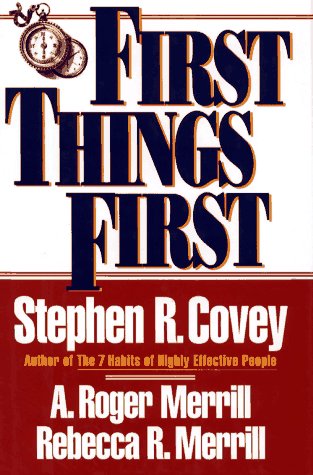Welcome to Thinkers Books, where we bring insightful summaries of transformative literature. Today, we delve into a game-changing book that has the power to transform your life and help you prioritise what truly matters. The book we’re exploring today is ‘First Things First’ by the legendary Stephen R. Covey, author of the best-selling book ‘The 7 Habits of Highly Effective People.’
In ‘First Things First,’ Covey takes us to re-evaluate our priorities, focus on what matters, and learn how to manage our time and energy effectively. The main themes of this book revolve around personal management, time management, and prioritisation. Covey introduces a new way of organising our lives, helping us shift our mindset from reactive to proactive, ultimately leading a more fulfilling and meaningful life.
Covey introduces the Time Management Matrix, which is divided into four quadrants: Urgent and Important, Not Urgent but Important, Urgent but Not Important, and Not Urgent and Not Important. Covey argues that most people spend their time in the first, third, and fourth quadrants, reacting to urgent matters or indulging in time-wasting activities. However, the key to effective time management and personal success lies in focusing on the second quadrant – the not-urgent but essential tasks.
Throughout the book, Covey provides practical techniques to help us shift our focus to the second quadrant. One such technique is the Weekly Planning Process, where we plan our week based on roles and goals rather than tasks. This approach ensures we maintain a balanced life and allocate time for all critical areas. Another key concept in the book is “sharpening the saw.” Covey emphasises the importance of self-renewal and investing in ourselves through physical, mental, emotional, and spiritual growth.
Here are my top 5 learning points from ‘First Things First’:
- Focus on the second quadrant: Prioritize tasks that are not urgent but important, as these will lead to long-term success and personal growth.
- Plan your week around roles and goals: Instead of creating a to-do list, plan your week based on the various roles you play in your life and your goals within each part.
- Sharpen the saw: Invest in yourself by regularly engaging in activities that promote physical, mental, emotional, and spiritual growth.
- Learn to say no: Develop the courage to say no to unimportant tasks or commitments, allowing you to focus on what truly matters.
- Delegate effectively: Recognize that you can’t do everything yourself and learn to delegate tasks to others when appropriate.
‘First Things First’ is a powerful book that challenges conventional wisdom on time management. It provides practical tools and techniques to help us prioritise our lives and focus on what truly matters. From a personal perspective, implementing the concepts from this book has made a significant difference in my life. Focusing on the second quadrant tasks has allowed me to grow personally and professionally. I’ve found that the more I invest in myself, the better equipped I am to tackle challenges and succeed.
As we conclude our exploration of ‘First Things First,’ we leave you with an inspiring quote from Stephen R. Covey: “The key is not to prioritise what’s on your schedule, but to schedule your priorities.” Remember, it’s up to you to take control of your life and ensure you focus on what truly matters.
Thank you for joining us on this enlightening journey. We invite you to explore more insightful book summaries here at Thinkers Books. Until next time, keep reading, keep learning, and keep growing!







